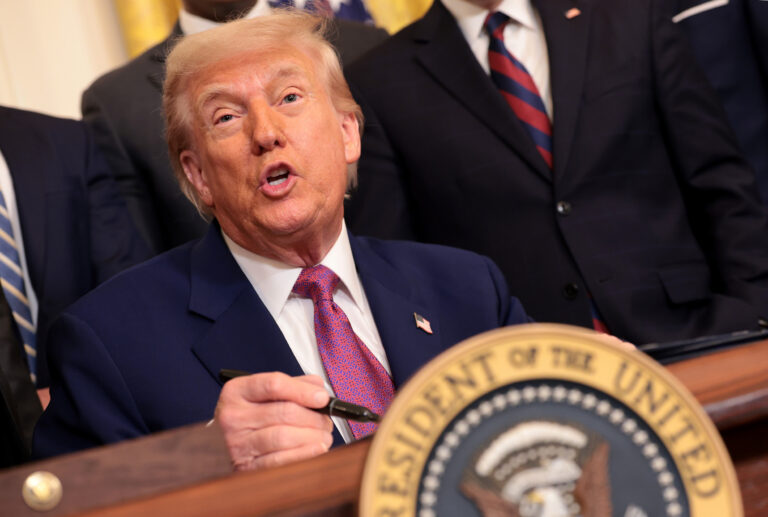After months of wrangling, Republicans managed to overcome divisions and pass their sprawling spending bill, which will affect various aspects of American life.
The One Big Beautiful Bill Act, the centerpiece of President Donald Trump’s domestic agenda, makes the 2017 tax cuts permanent, expands certain tax credits and deductions, and creates tax breaks on tips and overtime. It also boosts defense and border wall funding.
To offset these costs, the bill includes major reforms to Medicaid, the Supplemental Nutrition Assistance Program (SNAP) and clean energy incentives. It is projected to increase the federal deficit by up to $3.4 trillion over a decade and leave millions of vulnerable Americans without health coverage or food assistance.

Win McNamee/GETTY
The president is expected to sign the bill into law on July 4, but not every change is set for immediate effect. Here’s what you need to know about the changes and when they are set to begin.
Tax Policy
The legislation makes Trump’s 2017 tax policies permanent, including lower rates, reformed brackets and higher alternative minimum tax exemptions.
It also includes a one-time, permanent boost of $750 ($1,500 for couples) to the standard deduction, beginning for taxes payable for 2025.
A host of other policies are set to begin as early as the 2026 tax season, such as new deductions for tipped and overtime income for relevant workers and a new extra deduction for taxpayers aged over 65.
Medicaid and SNAP
Among the most contentious parts of the bill are the significant changes to Medicaid and SNAP that are set to take place over the coming years.
The bill introduces major reforms to Medicaid and SNAP. Able-bodied adults aged 19 to 64 must work, volunteer, study or train for at least 80 hours per month to qualify, with exemptions for parents of children under 15. Enrollees will face more frequent eligibility reviews, possible care costs up to $35 and heavier paperwork.
Federal funding to states is also set to shrink, a policy slated to begin in 2028.
SNAP recipients are also facing similar work requirements, which could begin as soon as this year. In 2028, for the first time, states with high error rates must pay up to 15 percent of SNAP costs.
Student Loans
Major changes to student loans are set for July 2026. Popular repayment plans such as SAVE, Income Contingent Repayment and Pay As You Earn are set to be eliminated, replaced by the new Repayment Assistance Plan or the standard repayment plan.
The Graduate PLUS loan program is also ending, to be replaced with borrowing caps—$100,000 for most grad students and $200,000 for law and medical students.
Parent PLUS loans are set to be capped at $65,000 and lose access to income-driven repayment options. Deferment for financial hardship would also end, though borrowers in default can now rehabilitate their loans twice instead of once.
What People Are Saying
White House press secretary Karoline Leavitt wrote on X, formerly Twitter: “President Trump’s One Big, Beautiful Bill delivers on the commonsense agenda that nearly 80 million Americans voted for—the largest middle-class tax cut in history, permanent border security, massive military funding, and restoring fiscal sanity. The pro-growth policies within this historic legislation are going to fuel an economic boom like we’ve never seen before. President Trump looks forward to signing the One Big, Beautiful Bill into law to officially usher in the Golden Age of America.”
Senate Majority Leader John Thune wrote on X: “Americans elected @POTUS and the Republican Senate Majority to deliver an America First agenda—one that puts more money back in their pockets. The One Big Beautiful Bill does just that, delivering real tax relief and laying the foundation for a stronger, more prosperous nation.”
Former House Speaker Nancy Pelosi wrote on X: “The Republicans’ Big, Ugly Bill is the biggest transfer of money in history to the wealthy and well-connected—paid for on the backs of everyday Americans. It is an immoral Robin Hood in reverse of bad economics. The Big, Ugly Bill is a dangerous checklist of extreme Republican priorities: slashing funding for public schools, defunding Planned Parenthood, and making the largest cuts to Medicaid, Medicare and SNAP in history.”
Catherine D’Amato, the president and CEO at the Greater Boston Food Bank, said in a statement emailed to Newsweek: “These cuts are the largest in history, reducing or eliminating benefits for seniors, Veterans, children, legally-present immigrants, and working families. This Act shifts responsibility of paying for food and health care programs onto individual states—a burden that no state budget will be able to absorb without significant trade-offs to other critical state-funded social needs programs.”
Mark Koziel, the president and CEO of the American Institute of Certified Public Accountants, said in an emailed statement: “The passage of the One Big Beautiful Bill Act, which includes a number of important provisions beneficial to the accounting profession, is a win for millions of businesses, taxpayers and tax practitioners across the country.”
Kristen Crowell, the executive director of Fair Share America, said in a statement: “This is the ultimate betrayal. I’m hearing from people on the ground day in and day out who are furious that their tax dollars will go to the ultra-wealthy. The predominant concerns we hear from people are about care and costs: What will this mean for their health care? Will they have to go into medical debt to treat cancer or if someone falls ill? How will they stretch their already tight budgets even further? Donald Trump promised them that they would see costs go down. They haven’t, and now things are about to get even worse.”
What Happens Next
Trump is expected to sign the bill into law in a ceremony at the White House at 5 p.m. ET on July 4.


